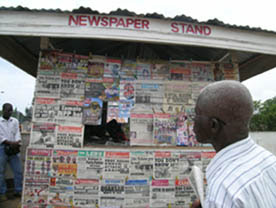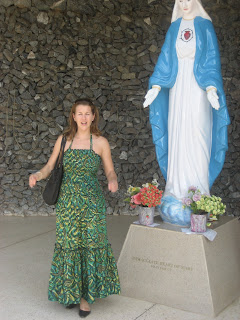Foreseen negative impact of the Dam
Proposed Halliburton Company Dam in Bui National Park, Ghana - Biologist Banned from Park
Despite the environmental disaster wrought by the World Bank's Akosombo Dam in Ghana (used for below cost power to process bauxite mined in Jamaica) and its failure to live up to power generating expectations, international aid donors are preparing to finance the building of another massive dam on the Black Volta River by a consortium led by a subsidiary of U.S. Vice President Richard "Dick" Cheney's scandal-plagued company, Halliburton. The dam would flood much of Bui National Park, eliminating an important remaining area of savanna woodland in northern Ghana and the Park's hippo population. Daniel Bennett, a British biologist, has led field expeditions to Bui National Park, studying hippos and other wildlife. He returned to Ghana in March 2001 for final studies on the hippos before their feeding habitat would be flooded, in the hope of devising a plan to assist the animals once displaced. However, Ghanaian officials were not happy to have someone knowledgeable about natural history around to refute their lies (i.e., that the hippos could be trapped and relocated), so when Bennett arrived in Ghana to continue his field work, he was denied permission to enter the Park.
The Bui Dam is an even greater environmental disaster than drilling in the Arctic National Wildlife Refuge, yet the international environmental groups have failed to take any action against it.United Nations Environment Programme Global 500 Forum: Courting Megadisaster: Bui Dam may Cause Havoc
"Over the years, dams have been touted as miracles of engineering for their role in providing electricity, drinking water and irrigation of lands etc."
"But the host of environment, social, technical and economic problems plaguing the industry are not so well known to many people who applaud such decisions by governments. These damages include the uprooting of human communities from lands they have owned for generations and forced resettlement somewhere else. In addition are the loss of riparian and terrestrial wildlife habitat due to the flooding and erosion and the disruption of ecosystems due to the equalized water temperatures and reversal of seasonal flow patterns. Furthermore is the premature loss of reservoir capacity due to silt accumulation at unexpectedly high rates, the degradation of downstream riverbanks and beds which requires expensive mitigation measures and the cost of resettling and maintaining large human populations."
"The government learnt nothing and forgot nothing"
"These issues of cost, environmental damage and energy insecurity have led to a rising decommissioning of dams in most parts of the world and a search for more efficient, safe and cost effective alternative forms of energy supply such as solar and windmills."
"Reeling from the devastating effects of power rationing and some of the above mentioned problems unleashed on Ghanaians by the Akosombo dam, one would have thought that the government will be serious in its search for alternative sources of energy but indications are that the government learnt nothing and forgot nothing. It is against this background that the recent announcement by the Vice-President that the government will be constructing the Bui Dam has come as a shock to many local and international environmentalists."
"The need for alternative sources of energy cannot be underestimated and it is not too late to tap the solar energy potential in the country and considerable resources along our lengthy coast. As a matter of fact, the use of these renewable alternative sources of energy can compliment the already existing grid power in rural electrification, water supply and other appropriate areas. These resources will offer more secure sources of energy supply. In Kenya which has a limited national electricity grid, more households now get their electricity from the sun.""People should no longer allow hydro-developers to trample on their rights and deprive them of their livelihoods, their lands and their rivers for the benefit of corporate profits, bureaucratic and political careers."
"After nearly three decades since the Akosombo dam began, communities that were relocated are still fighting for compensation particularly for the loss of fertile farm lands and buildings. But it's obvious that these dam-affected people have been long abandoned and forgotten."
Other news about the Dam worth reading:'What's hidden behind the Bui Dam Project?'
A dam at the cost of forests
Bui Dam Project Promises Bright Economic Prospects




